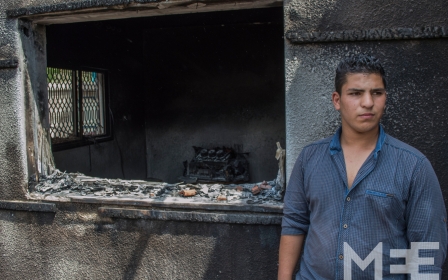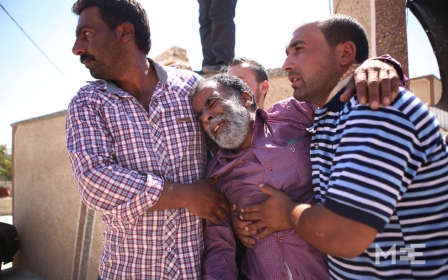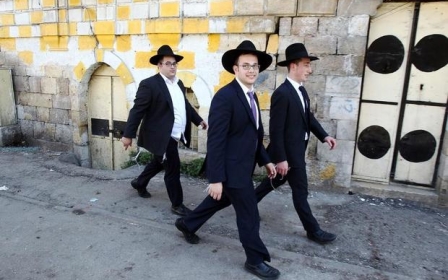Settler violence and their plan to blow up the Middle East

On 11 March 2011, unknown attackers entered the home of the Fogel family in the settlement of Itamar in the West Bank and stabbed to death five family members, including a five-month-old baby.
Suspicion fell on the nearby Palestinian village of Awarta. The Israeli army put the village’s 6,000 residents under curfew for almost a month, took DNA samples from most of the males and carried out violent house searches, raising criticism from human rights organisations. This aggressive mode of action bore fruits: two young men from the village were arrested and later admitted the killings.
In more recent times, three weeks have now passed since two masked men set fire to the Dawabshe family home in Duma village in the West Bank, 15 kilometers south of Awarta, burning to death eighteen month old baby Ali Saad Dawabsha and his father Saad Dawabsha.
Suspicion fell on settlers from a score of nearby Israeli illegal outposts, from which regular attacks on Palestinian villagers and property are launched.
No curfew was imposed on these small outposts with their few hundreds residents, no DNA samples were taken from its men, known for their extremist and racist anti-Palestinian ideology, no aggressive house searches were made, or polite ones, for that matter.
Needless to say, no suspect has been detained or arrested in connection with the deadly arson, whose perpetrators Prime Minister Benyamin Netanyahu himself vowed to "capture and bring to justice".
This is unlikely to come as a surprise for whoever deals with law enforcement against Israeli settlers suspected of crimes against Palestinians in the West Bank. According to a latest report by Yesh Din, an Israeli human rights organisation which gives legal aid to Palestinians who have fallen victim to settler's violence, only 7.4 percent of more than 1,000 complaints it has dealt with in the past decade have ended in indictment, and only 1.9 percent have ended in conviction.
"We encounter this attitude every day," says Gilad Grossman, spokesperson for Yesh Din.
"From the smallest complaint about material damage to Palestinian property to complaints about physical attacks. The policemen would come in delay, if they would come at all, and most of them don't speak Arabic. Evidences are not collected on site. There is a general attitude of apathy."
The Israeli General Security Service (GSS) - also known as Shabak - is supposed to lead these kinds of investigations. It has a special department, officially named the Department for the Defence on Democracy, but it is largely known as the Jewish Department. Contrary to the departments dealing with Palestinians, the Jewish Department has very little to offer in terms of solving hate crimes against Palestinians.
Since 2008, when settlers in the West Bank began to turn attacks against Palestinian civilians into an established way of action known as Tag Mehir (Price Tag), very few of its perpetrators were arrested or brought to trial.
Prior to the arson in Duma, fifteen other Palestinian homes were set on fire. No one was caught.
An Israeli politician, well informed on Shabak's activity, explained that the Jewish Department has no incentive to tackle these crimes. There is glory in solving terror attacks against Israelis, he said, but there is no glory in solving hate crimes against Palestinians.
No one is being promoted for solving such a crime. On the contrary, Jewish Department investigators are often targeted by right-wing activists, claiming that Price Tag attacks are fabricated by its Palestinian victims or by the Jewish Department itself.
And there is another obstacle. When it acts against Palestinian suspects subject to military rule, Shabak has almost unlimited power when it comes to curfews, house searches and checkpoints or tapping into any sort of communication or recruiting collaborators in return for permission to get medical care in Israel. However, when dealing with Jewish Israeli suspects, the acclaimed Shabak almost never has any of these means available.
The arson attack in Duma, as with other attacks by Price Tag activists, was condemned by the main stream settler's leadership, claiming that these were sporadic criminal acts, with no real network behind them. These kinds of remarks infuriate Eliaz Cohen, himself a settler from Kfar Etzion, who has led a campaign against these violent extremists for more than a decade.
"We are talking here about a closed sect which comprises of at least 1,500 people, between those involved in the attacks themselves to outer circles of supporters,"' said Cohen who claims to have been exposed to inside reports of the Jewish Department.
"They have a rabbi, Yitzchak Ginzburg, and they have a clear racist ideology. In their texts, like 'Torat Ha-Melech' (The King's Teaching), they explicitly justify the burning alive of Palestinian babies and explain how to do it."
According to Cohen, these Price Tag activists have a strategy: to set the Palestinian territories on fire, thus creating an all-out war not only in the West Bank and Gaza, but also with the Arab and Muslim world. Such a war will eventually lead to "restart" Israel as a state governed by Jewish religious laws and headed by the Messiah King, in the form of Rabbi Ginzburg himself. This explains why they target mosques and churches. This is why they chose to set fire to the Dawabshe home.
Cohen is frustrated by the impotence of the Jewish Department and other law enforcement bodies regarding these racist extremists who, according to him, are known to all. These Jewish activists, he claims, pose mortal danger to the very existence of the State of Israel, and they should therefore be treated as "ticking bombs," as Palestinian suspects are treated.
While exposing the dangers of these violent sects, Cohen still claims that the mainstream settler movement does not support these attacks, for practical as well as for moral reasons. One of the goals of the settlers’ movement is to show that settling among Palestinians is possible and sustainable. Price Tag attacks make these aspirations look void.
Yet it is hard to deny that support for these Price Tag activists comes from the very heart of the settler community or right-wing politicians. A report by the Israeli left-leaning Molad Center, indicates that funding of Price Tag activities comes from settler local councils, which in return are financed by the government.
When the Israeli General Attorney considered indicting the authors of above mentioned Torat Ha-Melech for racist incitement, 200 rabbis gathered in support of them. The decision to indict the authors was annulled.
Haaretz commentator Sefi Rachlevsky reminded us that Netanyahu himself described one of these rabbis as "a commando leading the People of Israel".
Whether the settlers do use these Price Tag attacks for their own purposes or whether they truly oppose it as Cohen claims, it is clear Israel, and maybe the settlers themselves, are trapped. After ignoring or even condoning violence against Palestinians for so many years, Israel finds it very hard to act against the closed communities from which these attackers come.
What makes it even more difficult is the fact that these closed communities operate in the no-man's-land of the so called “illegal outposts” supported and financed by governmental bodies, although built mainly on Palestinian private land.
When illegality runs so deep, it is almost impossible for legality to come in.
- Meron Rapoport is an Israeli journalist and writer, winner of the Napoli International Prize for Journalism for a inquiry about the stealing of olive trees from their Palestinian owners. He is ex-head of the News Department in Haaertz, and now an independent journalist.
The views expressed in this article belong to the author and do not necessarily reflect the editorial policy of Middle East Eye.
Photo: Palestinian women look at the damage at the Dawabshe family home on 4 August (AFP)
New MEE newsletter: Jerusalem Dispatch
Sign up to get the latest insights and analysis on Israel-Palestine, alongside Turkey Unpacked and other MEE newsletters
Middle East Eye delivers independent and unrivalled coverage and analysis of the Middle East, North Africa and beyond. To learn more about republishing this content and the associated fees, please fill out this form. More about MEE can be found here.





